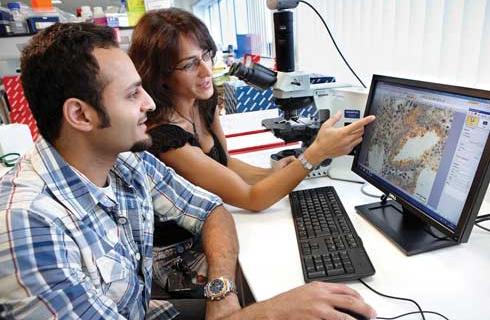国际学生入学条件
hold a bachelor's degree (BA or BS) from an accredited institution of higher learning
have an undergraduate GPA of 3.0 or above
submit Statement of Purpose
have taken one course each in organic chemistry, microbiology, biological science (in addition to microbiology), college physics, and biochemistry
arrange for two confidential recommendations (utilizing departmental recommendation MS Word or Acrobat PDF forms)
submit GRE scores
TOEFL® score (for Foreign Applicants only) Foreign students must obtain TOEFL scores of 580 minimum (600 recommended, 250 computer, IBT 100). Admission may be possible without prerequisites, in which case the student must complete deficiencies in the first year
International English Language Testing System (IELTS) score is accepted. The minimum required IELTS score is 7.0. IELTS scores have a recommended two year validity period.
展开
IDP—雅思考试联合主办方

雅思考试总分
7.0
- 雅思总分:7
- 托福网考总分:100
- 托福笔试总分:580
- 其他语言考试:NA
CRICOS代码:
申请截止日期: 请与IDP联系 以获取详细信息。
课程简介
Interest in nutrition, food, and the relationship of food to human health and fitness has never been greater than today. The Department of Human Nutrition, Food, and Animal Sciences offers a MS degree in food science. The areas of concentration include food safety and quality, food processing and engineering, food chemistry and biochemistry, food microbiology, food science education, and special area. Cooperating departments include Molecular Biosciences and Bioengineering, Plant and Environmental Protection Sciences, Tropical Plant and Soil Sciences, and Microbiology.<br><br>The learning objectives of the Food Science program are that students will:<br><br>Demonstrate mastery of fundamental knowledge in the field of food science.<br>Demonstrate advanced scholarship in their specialty area in the field of food science.<br>Communicate both orally and in writing at a high level of proficiency.<br>Conduct and interpret food research.<br>Function as a professional in their chosen discipline.<br>Students majoring in any of the curricula options are prepared for diverse careers in the food industry, health-care and fitness facilities, hospitals, nutrition education and communication enterprises, government or private-sector food and nutrition agencies, and scientific research laboratories. Graduates have found employment as college instructors, technical personnel in the food industry, regulatory or other governmental agencies, and researchers. Others have pursued further postgraduate studies.
展开







 预科
预科 奖学金
奖学金 实习机会
实习机会 在校学习
在校学习 跨境学习
跨境学习 校园授课-线上开始
校园授课-线上开始 在线/远程学习
在线/远程学习













 麦吉尔大学继续教育学院
麦吉尔大学继续教育学院

 麦吉尔大学继续教育学院
麦吉尔大学继续教育学院

 麦吉尔大学继续教育学院
麦吉尔大学继续教育学院

 不列颠哥伦比亚大学
不列颠哥伦比亚大学

 圭尔夫大学
圭尔夫大学

 卡尔顿大学
卡尔顿大学









 美国
美国
